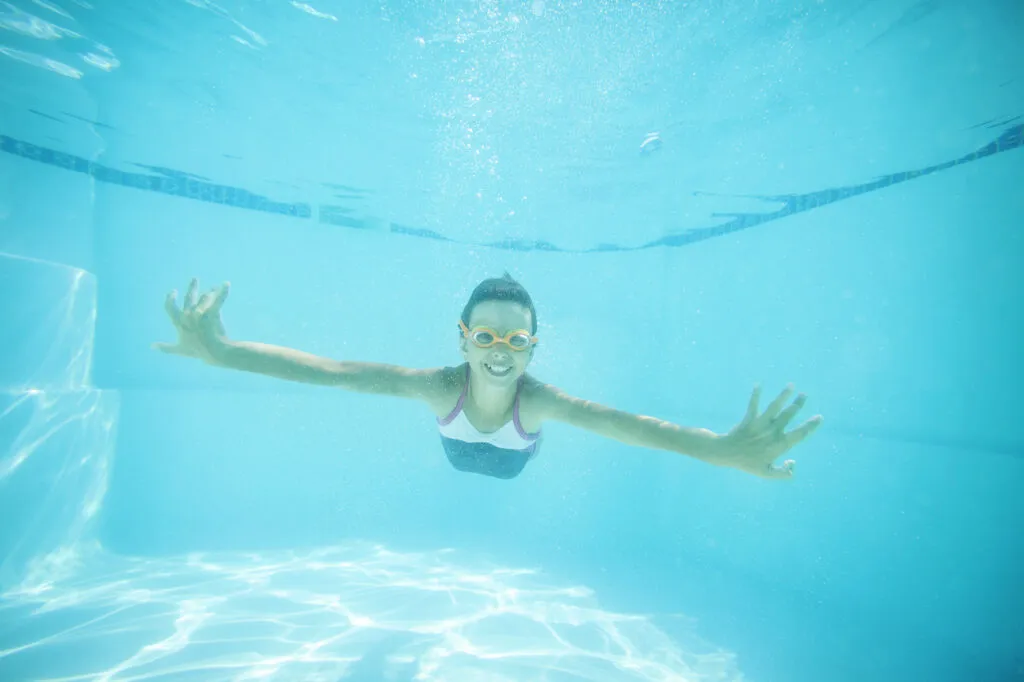Dreaming of a backyard oasis to beautify your space? One of the most overlooked decisions you’ll make when installing a pool is determining its depth. Pool depths vary based on several factors, and choosing the right depth can enhance your swimming experience. The depth of the pool is a central consideration in planning, as it impacts safety, design, and the types of activities your pool can accommodate.
Today, we’ll explore typical residential pool depths, what influences these depths, and how deeper pools affect maintenance. The most important thing is to ensure your pool design matches your family’s needs and intended use.
Understanding Typical Residential Pool Depths
When planning a pool, it’s helpful to know what is typical in the industry. Most residential pools have a shallow end of about 3.5 feet, ideal for wading and relaxing. The deep end, or maximum pool depth, usually ranges from 5 to 8 feet, perfect for swimming laps and possibly even some light diving.
According to industry standards, typical residential pools have an average swimming pool depth of 5.5 feet. This range caters to various activities while ensuring safety and comfort for most users.
Swimming pool depth recommendations suggest that most pools are designed to follow these guidelines, achieving the ideal depth for activities like lounging, cooling off, and recreational sports.
Factors Influencing Pool Depth
The intended use of the pool is often the determining factor in choosing the right residential pool depth. So what determines a good depth range? Several factors come into play when determining the ideal pool depths for a backyard pool:
For example, many pools designed for lap swimming or diving are built deeper, which results in a larger volume of water and increased maintenance needs. On the other hand, pools intended for relaxation or family use may have shallower areas for safety and comfort.
By considering all these factors, you can achieve the proper pool depth to suit your specific needs and preferences.
Intended Use
Your pool’s primary purpose significantly impacts its depth. If you envision a family pool for fun with kids, a shallower pool might be ideal. Family pools often feature shallow areas and a gentle slope to ensure safety and enjoyment for children and adults alike. Shallow depths offer safety and provide a play area for young swimmers. For play and recreation, fun pools are designed with depths suitable for casual swimming and games, making them perfect for children and family enjoyment. However, if you’re a fitness enthusiast looking to swim laps or practice dives, a deeper pool is necessary. Keep in mind that a diving pool should have at least 8 feet of depth to meet safety regulations and accommodate diving boards.
Space and Design
The available space and desired design features of your yard also play a crucial role. Limited backyard space may restrict how deep your pool can be. For instance, smaller yards might accommodate plunge pools that are around 4 feet deep, providing a cool retreat without extensive depth. If you want to optimize space and separate activity zones, an L-shaped pool or L-shaped design is a versatile option. This layout allows you to have a shallow area for children or lounging and a deeper section for swimming or diving, enhancing both safety and functionality. On the other hand, larger properties can support more extensive designs with varying depths, including deep ends for more diverse aquatic activities. When designing wading areas, consider making them suitable for children as well as long-legged people, ensuring comfort for all users.
Safety and Legal Considerations
Safety is paramount when deciding on residential pool depth. Ensure your pool complies with any local codes and safety standards, as these regulations often dictate minimum depths for diving areas and other features. Insurance policies may also require adherence to these standards to maintain coverage and liability protection. Most areas mandate specific depths for pools intended for diving to prevent accidents, particularly to reduce the risk of head injuries that can occur when diving into shallow pools. Additionally, installing safety features like gradual slopes, ledges, and designated wading areas helps keep children safe by providing appropriate zones for different age groups and swimming abilities.
Multiple Depths for Versatility
When it comes to designing your dream swimming pool, opting for a multiple depth pool can dramatically increase the versatility and enjoyment of your backyard oasis. Pools with multiple depths are thoughtfully crafted to accommodate a wide range of activities and swimmers of all ages, making them a popular choice for families and those who love to entertain.
A multiple depth pool typically features a shallow end—often around three feet deep—where young toddlers can safely wade in, kids can play games, and adults can stand comfortably while socializing or relaxing. This shallow area is perfect for playing beach games, lounging on a sun shelf, or simply enjoying the water without the need to swim.
As you move toward the deeper end, the pool depth gradually increases, often reaching five to eight feet or more. This deeper pool section is ideal for swimming laps, diving (with a proper diving board and a minimum depth of eight feet for safety), or providing a space for more adventurous swimmers. The gentle slope between the shallow and deep ends ensures a smooth transition, making the pool accessible and enjoyable for swimmers of varying heights and abilities.
One of the biggest advantages of a multiple depth pool is its ability to accommodate kids, adults, and guests with different swimming skills and preferences. Whether you want a wading area for small children, a consistent depth for lap swimming, or a deeper swimming pool for diving and water sports, such an installation offers something for everyone. Many pool designers and builders, like Aqua Blue Pools, specialize in creating custom pool designs with various depths, sun shelves, and gentle slopes to match your family’s needs.
Of course, a deeper pool or one with multiple depths may require more excavation and materials, which can increase the initial construction costs. However, the added functionality and fun make it a worthwhile investment for many homeowners. When planning your new pool, consider the purpose of the pool, who will be using it, and how you envision spending time in your backyard. Consulting with an experienced pool builder can help you determine the right pool depth and features to create a safe, enjoyable, and versatile space.
Maintenance Implications of Deeper Pools
While deeper pools offer more versatility, they may also require a bit more maintenance than shallower ones. Here are a few things to consider:
- Increased Water Volume: Deeper pools contain more water, which means more chemicals, time, and effort to maintain water quality. You’ll need to regularly monitor and adjust chemical levels to keep the water safe and clean. More water also means increased heating costs if you plan to use your pool year-round.
- Cleaning Challenges: Cleaning a deeper pool can be more challenging and time-consuming. Debris tends to settle at the bottom, making manual cleaning or robotic pool cleaners essential. Deeper areas may also require specialized equipment to ensure thorough cleaning, adding to maintenance complexity and cost.
- Structural and Repair Considerations: Lastly, deeper pools may require more careful structuring to withstand the pressure from greater water volumes. This could mean higher initial construction costs and more expensive repairs in the long run. Regular inspections are crucial to detect and address any potential issues early.
Keep in mind that maintenance requirements may also change after a few years as the pool ages or as your family’s needs evolve, especially if children grow and start using deeper areas of the pool.
Ready to Build Your Dream Pool?
Choosing the right pool depths involves balancing your needs, safety, and maintenance considerations. Whether you want a shallow pool for relaxation or a deeper one for versatile use, making an informed decision ensures years of enjoyment. If you’re ready to start building, consider partnering with Taylor Made Pools. Our expert team will help design and construct the perfect pool tailored to your preferences and space.
Discover the joys of a custom-built pool today. Visit Taylor Made Pools to learn more and get started on your backyard transformation!

